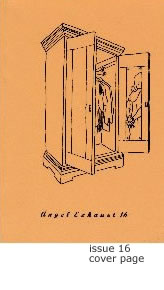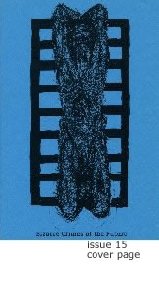 | |||||||||||||||||||||||||||||||||||||||||||||||||||||||||||||||||||||||||||||||||||||||||||||||||||||||||||||||||||||||||
|
| |||||||||||||||||||||||||||||||||||||||||||||||||||||||||||||||||||||||||||||||||||||||||||||||||||||||||||||||||||||||||
|
To be exact, I lost my enthusiasm in 1993, but this is the first moment since then when it looked as if the magazine wouldn't fold if I left. I dislike almost all aspects of being an editor except choosing the poems, which takes about ten minutes a year. Writing about 100 letters for each issue. Having no grant for 15 and 17 meant a considerable drain on my pocket. The last time I stopped (in 1995?), it was a huge relief, and I regret going back to it. I read an interview with Mark Eitzel of The American Music Club where he's talking about making a promo video: "I'm in a dunking booth, and every time the word Rise happens I fall in the water. There's dancing girls, it's corny. They've got these real bad mermaid outfits, they're tacky girls and they know it, y'know? We had them dance out of time to the music. At one point they said, This music is too slow, don't you have anything like Metallica". I used to identify with Mark Eitzel (loved those AMC albums) but increasingly I identify with the girls in the fish costumes: every time I read submissions I just mutter "Don't you have anything faster?" But, the scene needs a decent poetry magazine. In a 25 year history, Angel Exhaust has had 3 5-year breaks. The third has just finished. Lucky old world. I became involved in the project that became Angel Exhaust version 3 in autumn 1991 and negotiated a withdrawal in December 1998. In between, the magazine published more than 100 different poets and more than a thousand pages of text. The continuation of the counter-culture by brilliant poets after its demise was our initial area of interest; faced with claims in the Bloodaxe The New Poetry (imitating Morrison and Motion) that nothing of great interest happened in the sixties and seventies. On the contrary, sheepshanks, there was a poetic revolution, and most of the interesting poetry of the nineties was a direct consequence of it. Exchanges on the British poetry messaging network have equated me, and Angel Exhaust, with the Gulf War. Apparently AE was also the product of aggression and "bedded with money" and so just like the military-industrial complex. When raising some new ideas is seen as aggression, it's easy to discover that the regulars of the small press world are territorial, conservative, and obsessed. This sensitivity and territorial bulk make movement difficult. We took a lot of flak for pointing out that bad poets loved the counter-culture, i.e. the equivalent of "progressive music wasn't all wonderful". This attitude proved unacceptable to the counterparts of ELP, Uriah Heep, and Widowmaker. We didn't indulge baffled old bozos from the bottom of the pond, wandering round telling strangers that "I could have been bigger than John James". Olsonian occultists with CHAS tattooed on one set of knuckles and DAVE on the other. How society really works, by sources close to the Lobster Men of Pascagoula. Sound poetry by Colonel Mustard. Mussolini, he was there, Shooting peanuts in the air. So it was also claimed on one of the mud chutes of the Internet that my reviewing policy was a breach of loyalty to the community. This is only so if you exclude from that community almost everyone who reads poetry. From the outside, the gap between Neil Astley and Bob Cobbing is only about a millimetre, and the idea that there is a bitter opposition between the two is puzzling. I identify with the poetry world as a whole, and this makes it impossible to share the tiny avant-pond's totalitarian self-regard; which, indeed, is soaked in latent hostility to everyone else, whose legitimacy they deride. Angel Exhaust-a skyful of F-111s? a skiff a-skimming across the scams? or two blokes in haddock suits? In a leisure culture where everything is self-referential and unnecessary, the acquisition of loyalty is the moment of forgetting that the initial decisions have the status of decisions, and is therefore a block preventing perception. If entering a work of art means becoming somebody else, then imposing too many loyalty tests on what kind of somebody you're allowed to become can prevent the art process from proceeding. Loyalty is notoriously short-range and liable to give eccentric results for anything outside its range. I am very much concerned with the internal complexity of self-referential systems, but the precondition of this becoming visible is the awareness of its arbitrariness which is yielded by comparison with many other little self-referential systems. The interest of closely comparing a hundred different contemporary poets is that one catches glimpses of why we are different from each other. The border which people draw (different people in different places) between the free (arbitrary) and the bound (or traditional, organic) is a key device. Is individuality (what makes the commodity prizable) a function of what was there at the beginning, or is it a function of complexity, and hence late in arrival, something unforeseen that emerges from the juxtaposition of powerful autonomous patterns? Metallica recently did an album (2 CDs) of cover versions, releasing their enthusiasm for great music. Thirty years of "metal, thrash, punk, and post punk". They came, as a band, straight out of Lars Ulrich's huge collection of underground English heavy metal albums. I thought the magazine would be like this, a kind of personal tape of all the great things I loved from the past thirty years. It didn't turn out that way. An editor can say no to things but is otherwise uninfluential. A key influence on the project was Julian Sanderson, who gave me a long lecture (in 1991?) on why magazines had to have spines and be A5. His parents ran a bookshop, so he knew that something with no spine couldn't be exhibited properly and wouldn't sell. At that moment, AE became committed to the bookshop, and so to the world of competition and choice. This focus rapidly brought the realisation that the reader is not wrong. Another act of treachery, for the solidarity group of poets. If you produce something made up of stapled A4 photocopies, it doesn't physically fit on bookshop shelves, can't be recognized side-on, and will reach the personal friends of the contributors. AE was always trying to reach the uncommitted reader. Further, it actually tried to explain what the difficult poetry was about. It didn't try to put the reader through loyalty tests. The main responsibility for the success of the venture belongs to Ewan Smith, our typographer. He gave it its physical shape. Ewan supplied (free) several thousand pounds worth of expertise, detailed work, and use of high-tech equipment, which I am all the more grateful for since he didn't like the magazine-as it wasn't Grosseteste Review. Issue Eight (the first one of the revived magazine), of 1992, included only poets who had begun in the 1970s; through difficult research, we caught up, and published mainly poets who had begun in the nineties. This was pioneering, but served to minimise sales. People in England generally feel that "cultural history stopped when I was thirty"; worse, people who had claimed, in their twenties, to be The Future, bear resentment against anyone younger than them who isn't carrying out their instructions. During the 1996 French elections, I was working at the French cultural centre in London, and saw a magazine where a teenager was saying that the generation of 68 were the worst thing around, because they were completely cynical and yet endlessly self-regarding. The fewer ideals they have left, the more they hate anyone who has ideals. I was struck by this, it's on the axis along which the magazine has twisted over the past seven years, but also (a) it's very close to what feminists were saying in about 1971, they did a microtomography of it (b) it's only a partial truth, about self-seeking people, and political idealism is probably the only basis for great poetry in the present age. Andrew Duncan, Editor
| |||||||||||||||||||||||||||||||||||||||||||||||||||||||||||||||||||||||||||||||||||||||||||||||||||||||||||||||||||||||||
| |||||||||||||||||||||||||||||||||||||||||||||||||||||||||||||||||||||||||||||||||||||||||||||||||||||||||||||||||||||||||
|
| |||||||||||||||||||||||||||||||||||||||||||||||||||||||||||||||||||||||||||||||||||||||||||||||||||||||||||||||||||||||||
Issues available online
ISSN
0143-8050
Current editors
Andrew Duncan and Charles Bainbridge
Contact address
Email: [email protected]
magazine list
- Features

- zines

- 10th Muse
- 14
- Acumen
- Agenda
- Ambit
- Angel Exhaust
- ARTEMISpoetry

- Atlas
- Blithe Spirit
- Borderlines
- Brando's hat
- Brittle Star

- Candelabrum
- Cannon's Mouth, The
- Chroma
- Coffee House, The
- Dream Catcher
- Equinox
- Erbacce
- Fabric
- Fire
- Floating Bear, The
- French Literary Review, The
- Frogmore Papers, The
- Global Tapestry
- Grosseteste Review
- Homeless Diamonds
- Interpreter's House, The
- Iota
- Journal, The
- Lamport Court
- London Magazine, The
- Magma
- Matchbox
- Matter
- Modern Poetry in Translation
- Monkey Kettle
- Moodswing
- Neon Highway
- New Welsh Review
- North, The
- Oasis
- Obsessed with pipework
- Orbis
- Oxford Poetry
- Painted, spoken

- Paper, The
- Pen Pusher Magazine

- Poetry Cornwall
- Poetry London
- Poetry London (1951)
- Poetry Nation
- Poetry Review, The
- Poetry Salzburg Review
- Poetry Scotland
- Poetry Wales
- Private Tutor
- Purple Patch
- Quarto
- Rain Dog
- Reach Poetry
- Review, The
- Rialto, The
- Second Aeon
- Seventh Quarry, The
- Shearsman
- Smiths Knoll
- Smoke
- South
- Staple
- Strange Faeces
- Tabla Book of New Verse, The
- Thumbscrew
- Tolling Elves
- Ugly Tree, The
- Weyfarers
- Wolf, The

- Yellow Crane, The


